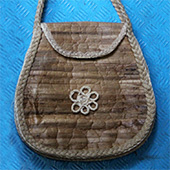Design Resource
Eco-friendly Fiber Bags - Alleppey, Kerala
Green Products
by
Prof. Bibhudutta Baral and Sandhya B.
In this era of plastic, it is much needed to notice the eco-friendly products and use them. Eco-friendly as we all know literally means earth-friendly/ not harming the surrounding or environment. Using eco-friendly products saves the environment from contamination with products that aren’t biodegradable. We all must include these products prior to those of plastic and enhance our living.
Natural fibers that appear as hair-like raw material can be defined as bio-based fibers or fibers that are obtained from vegetables and animals, meaning all natural cellulosic fibers such as cotton, jute, sisal, coir, and flax, hemp, abaca, ramie and protein-based fibers such as wool and silk. They can be spun into filaments, threads or ropes and can be woven, knitted, matted or bound. Since natural fibers are obtained from natural sources, they do not need any formation. They are convertible into nonwoven fabrics such as felt or paper, after spinning into yarns to woven cloths. Though nature abounds in fibrous materials, especially cellulosic types, only a small number can be used for textile and other industrial purposes. The effectiveness of the utility of fiber for commercial purposes is determined by properties such as length, strength, pliability, elasticity, abrasion resistance and more. There are various advantages of natural fibers, the materials that are produced from natural fibers are the least harmful to our environment, natural fibers don’t cause skin irritations, and they are biodegradable. A truly eco-friendly product keeps both environmental and human safety in mind, it includes the use of sustainably grown ingredients produced in many ways that do not deplete the ecosystem. Hence they are known as environmentally friendly or green products as they cause minimal harm to people and the environment. Jute is called as a golden fiber as it plays a key role in the fibre industry. It is one of the strongest natural fibers and stands in second place in cotton in terms of global production. They are approximately 4 meters long, soft and shiny. It consists of cellulose and lignin making it biodegradable, and eco-friendly. Water hyacinth is another plant that helps to make products that are eco-friendly. The plant is picked up from the water, the leaves and roots are cut, and stems are allowed to dry completely. These dried stems are used to produce various products.
Alleppey is also known as Allappuzha (in Malayalam language) is a landmark between the broad Arabian Sea and a web of rivers flowing into it. The name is derived from the geographical positioning and physical features of the place. It is noted all over the world for the coir and coir products production. Cherthala is a town located twenty-two kilometers north of Allappuzha and Thiruvizha is five kilometers south-west of Cherthala. The use of fibers to make eco-friendly products is observed in the place and the master craftsman Chandradas has gained many awards for taking the fibre handicrafts to another level. Mr. Chandradas has been in this business from the past thirty-five years. With the support of the Indian and the Kerala Government, he has been intensively working on producing ecofriendly products and teaching them to others. Workshops are held mostly for women folks in order to help them grow and enrich themselves. Training in producing these ecofriendly products has been given to the people who have come from Gujarat University, Gandhi Samara Seva, and the Ministry of textiles – about natural dye and natural products, business people who have been active in the natural fiber market. With passionate research, the way of putting these natural fibers to use has been founded by the artist.




